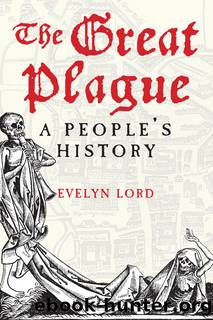The Great Plague by Evelyn Lord

Author:Evelyn Lord
Language: eng
Format: epub
ISBN: 9780300173819
Publisher: Yale University Press
CHAPTER 8
A HARVEST OF DEATH
THE WEATHER IN East Anglia at the beginning of July 1666 was wet, and hailstones threatened the crops ripening in the fields.1 At least the rain sluiced the streets of Cambridge and kept people indoors, so, they hoped, it would stop the spread of the infection. The weather then turned hot and humid; people complained of headaches and difficulty in breathing. Towering thunderheads massed over the town, and on 7 July there was a gigantic thunderstorm. Lightning, great rolls of thunder, hail and a strong wind swept the town as the clouds released their massive energy.2 Children screamed at the noise, people lay on their beds with their fingers in their ears as the lightning crackled and thunder exploded above them. Some counted the interval between the lightning and the crack of the thunder. It was very short. Some prayed that their houses would not be struck by lightning and burnt to the ground, and others that it was not the end of the world. Those who had mirrors covered them up in case they should attract the lightning, others hid in cupboards, under stairs and in cellars. When the storm was over, those who could leave their houses found the streets cleansed by the rain but trees and plants bowed down by the wind.
As well as the houses closed by the plague in June 1666, five more were shut up in the first week of July: those of the Joyces in St Bene't's parish who lived close to Corpus Christi College, the Smiths in Holy Trinity, Widow Tebald, John Fisher, and the Brierleys of All Saints.3 Richard Joyce came from a family that had lived in St Bene't's from at least 1629 but by quick thinking had avoided paying any rates or taxes.4 The family survived the plagues of the 1630s and '40s, and in 1652 Richard married Joan Papworth. They had six children, twins Susan and Richard, Mary baptised in 1653, followed by Abigail, who only lived three days, then Thomas, and the youngest, Elizabeth, baptised in 1663.5 Richard picked up work where he could, but what he preferred to hard labour was drinking in the taverns with his mates, and gambling. He gambled on anything – cockfights, bull baiting, horse and foot races, and in the damp first days of July on which raindrop would reach the bottom of the tavern window first. He was also known by his neighbours to be quick with his fists. He lashed out if someone looked at him or spilt his drink in a tavern, jostled him in the street, or refused to pay up when he had won a bet. In 1660 he was arrested by the university proctors for affray in Barnwell, after he had been to a card game in the Brazen George, and he was not unfamiliar with the inside of the Tolbooth in Petty Cury, or the vice-chancellor's prison.6 When his daughter Susan fell ill, with what his wife described as a
Download
This site does not store any files on its server. We only index and link to content provided by other sites. Please contact the content providers to delete copyright contents if any and email us, we'll remove relevant links or contents immediately.
| Africa | Americas |
| Arctic & Antarctica | Asia |
| Australia & Oceania | Europe |
| Middle East | Russia |
| United States | World |
| Ancient Civilizations | Military |
| Historical Study & Educational Resources |
Magic and Divination in Early Islam by Emilie Savage-Smith;(1195)
Ambition and Desire: The Dangerous Life of Josephine Bonaparte by Kate Williams(1087)
Operation Vengeance: The Astonishing Aerial Ambush That Changed World War II by Dan Hampton(986)
What Really Happened: The Death of Hitler by Robert J. Hutchinson(868)
London in the Twentieth Century by Jerry White(847)
Time of the Magicians by Wolfram Eilenberger(843)
Twilight of the Gods by Ian W. Toll(812)
The Japanese by Christopher Harding(798)
Papillon by Henry Charrière(794)
Lenin: A Biography by Robert Service(779)
The Devil You Know by Charles M. Blow(778)
Twelve Caesars by Mary Beard(766)
Freemasons for Dummies by Hodapp Christopher;(747)
The Churchill Complex by Ian Buruma(730)
Napolean Hill Collection by Napoleon Hill(703)
The Enlightenment by Ritchie Robertson(691)
Henry III by David Carpenter;(688)
Bohemians, Bootleggers, Flappers, and Swells: The Best of Early Vanity Fair by Bohemians Bootleggers Flappers & Swells- The Best of Early Vanity Fair (epub)(685)
The Rise and Triumph of the Modern Self by Unknown(658)
